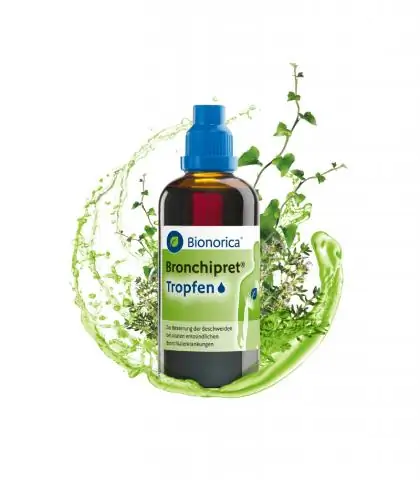- Author Rachel Wainwright wainwright@abchealthonline.com.
- Public 2023-12-15 07:39.
- Last modified 2025-11-02 20:14.
Midrimax
Midrimax: instructions for use and reviews
- 1. Release form and composition
- 2. Pharmacological properties
- 3. Indications for use
- 4. Contraindications
- 5. Method of application and dosage
- 6. Side effects
- 7. Overdose
- 8. Special instructions
- 9. Application during pregnancy and lactation
- 10. Use in childhood
- 11. Use in the elderly
- 12. Drug interactions
- 13. Analogs
- 14. Terms and conditions of storage
- 15. Terms of dispensing from pharmacies
- 16. Reviews
- 17. Price in pharmacies
Latin name: Midrimax
ATX code: S01FA56
Active ingredient: tropicamide (tropicamide), phenylephrine (phenylephrine)
Manufacturer: Promed Exports, Pvt. Ltd. (India), Sentiss Pharma Pvt. Ltd. (India)
Description and photo update: 2018-21-11
Prices in pharmacies: from 572 rubles.
Buy

Midrimax is a combined drug for topical use in ophthalmology that dilates the pupil; m-cholinergic receptor blocker in combination with an alpha-adrenergic agonist.
Release form and composition
Midrimax is available in the form of eye drops: a clear solution from light brown-yellow to colorless (5 ml each in a plastic dropper bottle or in a plastic bottle with a dropper stopper, 1 bottle in a cardboard box).
1 ml drops contain:
- active ingredients: tropicamide - 8 mg; phenylephrine hydrochloride - 50 mg;
- auxiliary components: hypromellose, sodium metabisulfite, disodium edetate, benzalkonium chloride, hydrochloric acid, sodium hydroxide, water for injection.
Pharmacological properties
Pharmacodynamics
The effectiveness of Midrimax is due to the pharmacological properties of its active components, the mechanisms of action of which differ:
- phenylephrine: a non-selective alpha-adrenergic agonist, has a pronounced stimulating effect on postsynaptic alpha-adrenergic receptors and a slight one on beta1-adrenergic receptors. After instillation into the eye, it causes dilation of the pupil (mydriasis), promotes the outflow of intraocular fluid and narrowing of the vessels of the conjunctiva. The vasoconstrictive effect of phenylephrine is similar to the action of norepinephrine (norepinephrine), but it has practically no chronotropic and inotropic effects on the heart. In addition, in comparison with norepinephrine, the vasopressor effect of phenylephrine is weaker, but more prolonged. Pupil dilation occurs within 10-60 minutes after a single instillation due to contraction of the dilator of the pupil and smooth muscles of the arterioles of the conjunctiva, and persists for 240-360 minutes. Phenylephrine-induced mydriasisnot accompanied by cycloplegia;
- tropicamide: m-anticholinergic, as a result of blocking the m-cholinergic receptors of the sphincter of the pupil and ciliary muscle, it causes short-term mydriasis and accommodation paralysis. Tropicamide ensures the achievement of mydriasis within 5-10 minutes after instillation. The maximum expansion of the pupil occurs at 20-45 minutes and lasts for 60 minutes. The pupil condition returns to normal after 360 minutes.
Tropicamide causes a slight increase in intraocular pressure. Phenylephrine supplementing the action of tropicamide reduces its ability to increase intraocular pressure or stops it.
Pharmacokinetics
Both active components of Midrimax easily penetrate the tissues of the eye.
The maximum concentration of phenylephrine in blood plasma is reached 10-20 minutes after instillation. Phenylephrine is excreted through the kidneys in the form of inactive metabolites and less than 20% of the administered dose unchanged.
Tropicamide is rapidly absorbed into the systemic circulation. At the fifth minute after administration, its average maximum concentration in plasma can range from 1.1 ng / ml to 4.5 ng / ml, and after 60 minutes - 0.46 ng / ml.
Indications for use
According to the instructions, Midrimax is indicated for pupil dilation during diagnostic ophthalmic procedures or before surgical and laser operations.
Contraindications
- angle-closure (narrow-angle) glaucoma;
- concomitant therapy with monoamine oxidase (MAO) inhibitors and a period of three weeks after their withdrawal;
- thyrotoxicosis;
- angina pectoris, arrhythmia, coronary sclerosis, hypertensive crisis and other diseases of the cardiovascular system;
- insulin-dependent diabetes mellitus (type 1);
- period of pregnancy;
- breast-feeding;
- age up to 18 years;
- hypersensitivity to the components of the drug.
Care must be taken when using Midrimax eye drops in patients with type 2 diabetes mellitus, in old age.
Instructions for the use of Midrimax: method and dosage
The solution is intended for introduction into the conjunctival sac by instillation.
Recommended dosage: 1-2 drops 15-30 minutes before the diagnostic procedure or surgery.
Side effects
- on the part of the organ of vision: increased intraocular pressure, transient burning sensation and pain in the eye, photophobia, pain in the region of the eyebrows, allergic reactions, transient decrease in vision, release of pigment into aqueous humor, lacrimation, temporary increase in intraocular pressure; with narrowing of the angle - blocking of the anterior chamber angle, keratitis, conjunctival hyperemia; rarely - reactive miosis after the first injection (more often manifested in elderly patients, it should be borne in mind that repeated instillations can cause a less pronounced dilatation of the pupil);
- from the nervous system: headache; sometimes dizziness;
- from the gastrointestinal tract: dry mouth, decreased tone and peristalsis, constipation; sometimes vomiting;
- on the part of the cardiovascular system: arrhythmia, bradycardia, tachycardia, increased blood pressure (BP), pulmonary embolism, ventricular occlusion of the coronary arteries; with diseases of the cardiovascular system in elderly patients, it is possible - the development of ventricular arrhythmias, myocardial infarction.
- from the urinary system: frequent urge and / or difficulty urinating;
- dermatological reactions: pallor and dryness of the skin, contact dermatitis, redness of the skin;
- from the musculoskeletal system: muscle stiffness.
Overdose
Symptoms: against the background of accidental ingestion of drops inside - hyperthermia, dry skin and mucous membranes, mydriasis, agitation, tachycardia, convulsions, respiratory depression, coma.
Treatment: immediate gastric lavage, intake of activated charcoal, cold compresses to lower body temperature. As an antidote, intravenous (IV) slow administration of physostigmine (at the rate of 0.03 mg per 1 kg of patient weight), benzodiazepines is indicated. The systemic effect of phenylephrine is stopped by intravenous administration of 5-10 mg of phentolamine or another alpha-blocker. If there is no therapeutic effect, the injection should be repeated.
special instructions
30-45 minutes after the introduction of the drops, a significant contraction of the pupil dilator can cause the appearance of pigment particles from the iris layer of the membrane in the moisture of the anterior chamber of the eye. When differentiating the suspension that has arisen in the chamber moisture, one should take into account the possible manifestation of anterior uveitis or the ingress of blood corpuscles.
When using any contact lenses, they should be removed before instilling Midrimax; the lenses can be reinstalled only 15 minutes after the procedure.
After instillation, it is recommended for 1-2 minutes with your finger to lightly press on the projection area of the lacrimal sacs at the inner corner of the eye, this will reduce the intake of the drug into the systemic circulation and reduce the risk of developing side effects of a systemic nature.
Influence on the ability to drive vehicles and complex mechanisms
After using Midrimax drops, visual acuity may decrease, therefore, you should refrain from operating complex mechanisms and vehicles until the clarity of vision is fully restored.
Application during pregnancy and lactation
The use of Midrimax is contraindicated during the period of gestation and breastfeeding.
Pediatric use
You can not use Midrimax in patients under the age of 18 years.
Use in the elderly
It is recommended to use Midrimax eye drops with caution in elderly patients.
There is a risk of developing ventricular arrhythmias and myocardial infarction in the presence of diseases of the cardiovascular system.
Drug interactions
With the simultaneous use of Midrimax:
- tricyclic antidepressants, methyldopa, m-anticholinergics: may enhance the vasopressor effect of the drug;
- beta-blockers: can enhance the vasoconstrictor effect of the drug;
- guanethidine and other adrenergic blockers, monoamine reuptake inhibitors: increase the risk of hypertensive crisis when combined with phenylephrine;
- MAO inhibitors (including after stopping them for 21 days): increase the risk of developing systemic adrenergic effects;
- local anesthetics: with their preliminary instillation, they can increase systemic absorption of the drug and prolong mydriasis.
Analogs
The analogues of Midrimax are: Atropine sulfate, Atropine, Cyclomed, Midriacil, Tropicamide, Midrum, etc.
Terms and conditions of storage
Keep out of the reach of children.
Store at temperatures up to 25 ° C in a dark place, do not freeze.
Shelf life is 2 years.
Terms of dispensing from pharmacies
Dispensed by prescription.
Reviews about Midrimax
Reviews of Midrimax ophthalmologists indicate the high effectiveness of the drug. They indicate fast action and good dilation of the pupil for optical studies and operations.
In addition to side effects, more often of a local nature, the disadvantages of the drug include its absence in pharmacies.
Price for Midrimax in pharmacies
The price of Midrimax for 1 bottle (5 ml) can range from 558 rubles.
Midrimax: prices in online pharmacies
|
Drug name Price Pharmacy |
|
Midrimax eye drops 5ml 572 r Buy |
|
Midrimax eye drops 5 ml 1 pc. 573 r Buy |

Anna Kozlova Medical journalist About the author
Education: Rostov State Medical University, specialty "General Medicine".
Information about the drug is generalized, provided for informational purposes only and does not replace the official instructions. Self-medication is hazardous to health!






